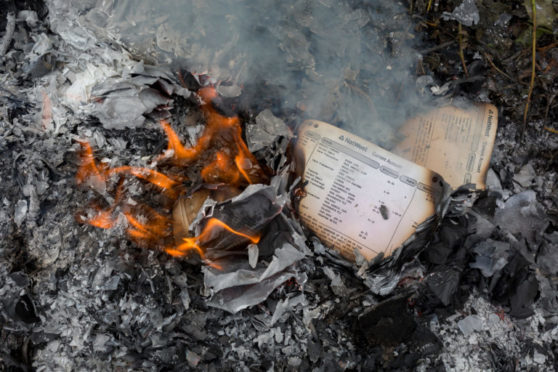
Scotland’s most senior prosecutor has asked Police Scotland if fiscals were told potential evidence of fraud at an undercover unit had been incinerated.
Piles of secret and sensitive files were destroyed in a garden incinerator outside the Scottish Crime and Drug Enforcement Agency’s (SCDEA) Paisley HQ in April 2011.
The documents were destroyed, in breach of all protocols, six days after the apparent financial mismanagement at the SCDEA Special Operations Unit (SOU) was exposed by a whistleblower in April 2011 and 12 days before an internal investigation was formally launched.
In July 2011, police asked the Crown Office to consider whether any fraud had been committed and a week later prosecutors said there was no evidence of criminality.
But Scotland’s chief law officer has now revealed that “no reference was made” to the burning of paperwork in documents retained by the Crown. Lord Advocate James Wolffe QC has asked Police Scotland for an explanation.
In an answer to a parliamentary question tabled by Liam Kerr MSP, Mr Wolffe said: “The documentation retained by COPFS makes no reference to the burning of paperwork by the SCDEA. Senior officials from COPFS have asked Police Scotland for further information in relation to that specific matter.”
Mr Kerr, the shadow cabinet secretary for justice, said: “We have now seen several reports into this matter but still don’t seem to have any answers to the key questions. This lack of clarity is not reassuring.”
It has also emerged Scotland’s police watchdog has not yet seen an independent review of the how the national force investigated the scandal.
The Scottish Police Authority (SPS) board was only handed an executive summary of the Metropolitan Police Service’s review of Police Scotland’s probe into events at SCDEA in 2011.
MSPs have criticised Chief Constable Iain Livingstone for failing to release the full Met report before the SPA board was given the opportunity to question Mr Livingstone at a meeting on November 27.
Liam Kerr said: “Without access to the Met review, the SPA could not question the Chief Constable fully. As a result this issue should be reinvestigated, so that we can finally get to the bottom of this mess.”
Liam McArthur MSP, the Scottish Lib Dems justice spokesman, said: “It is baffling that after almost a year of reviews and reports, the full facts of what happened in the SCDEA are still not clear. Transparency in the national force should not have to be such an uphill battle.”
Susan Deacon, who was chair of the SPA until she resigned on December 5, also revealed Police Scotland handed over the Met’s executive summary “very late in the day”.
She added: “That’s why the Chief Constable was required to give a full verbal report to the public meeting of the authority and to provide a further written report.”
The Chief Constable’s written report was not delivered to the SPA board until after 4pm on Friday.
It stated that the burning of documents was done “under the direction” of a now retired SCDEA detective inspector. The Chief Constable said the events were “deplorable and unprofessional”. The Chief Constable said Police Scotland’s review of the saga, known as Operation Towering, had taken evidence from the retired DI, who insisted the destroyed documents were 10 to 12 years old, and were no longer required.
Operation Towering concluded that the documents incinerated were not detrimental to the 2011 SCDEA Professional Standards Unit investigation and did not relate to any financial irregularities.
However, the executive summary of the Met’s review of Operation Towering said it “cannot confidently conclude the same assumption”.
The Met said: “The timely manner of the incineration, its closeness in time to a professional standards investigation into the SOU and the lack of any audit or record of destruction, throws sufficient doubt that this can be the only conclusion.”
Yesterday, one source said the suggestion that the destroyed documents were at least 10 years old was wrong. He said: “Documents from two full filing cabinets were destroyed. One of them related to the work done by the officer still running the unit in 2011 but he had not worked there for 10 years.
“In any case, if the DI had been told to clear up the mess why would his priority be the destruction of old files? It was the more recent files that were the potential problem and the potential evidence.”
David Crichton, vice-chair of the Scottish Police Authority, who is now heading up the watchdog, has now told the Chief Constable he wants to see the full Met review.
In a letter to John Finnie MSP, who is the convenor of the Scottish Parliament’s justice sub-committee on policing, Mr Crichton said: “I have discussed this with the Chief Constable and he has agreed to allow me to consider the report in full. Due to the sensitive nature of the material in the report related to covert policing and the personal information it also contains my access to the report will be controlled.”
The SPA said Mr Crichton is now considering what further scrutiny is needed, and who should be brought back before the board to answer further questions.
Mr Finnie said: “The sub-committee is pleased the SPA will be looking further at this, as unanswered questions remain.”
Police Scotland said: “We have provided a comprehensive report on SCDEA legacy matters to the Scottish Police Authority, which has been published on their website. Since the creation of Police Scotland, the governance and oversight of covert policing has been significantly strengthened and improved.”

Enjoy the convenience of having The Sunday Post delivered as a digital ePaper straight to your smartphone, tablet or computer.
Subscribe for only £5.49 a month and enjoy all the benefits of the printed paper as a digital replica.
Subscribe